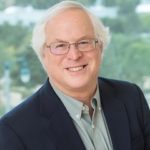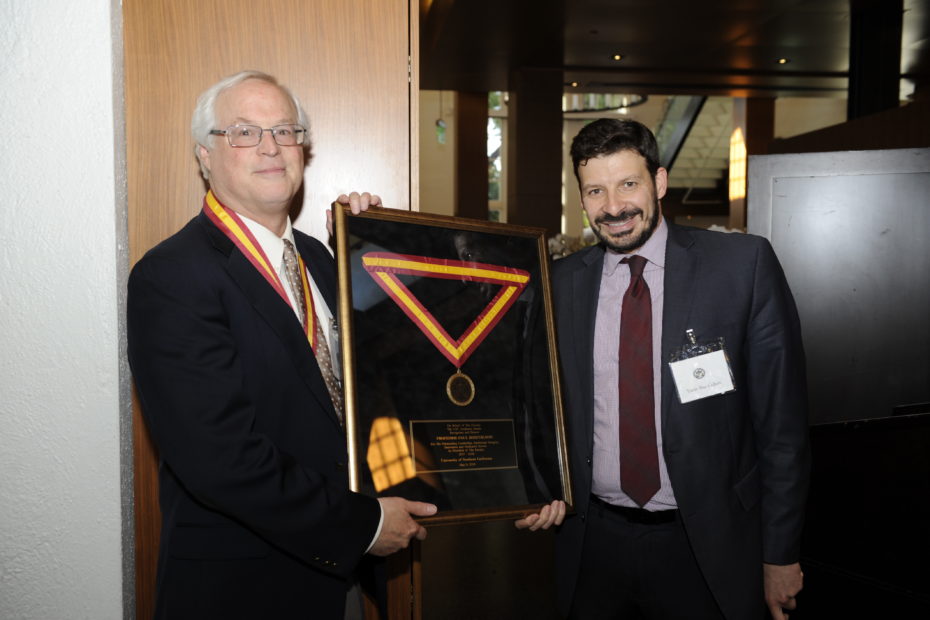Other articles in the May 2018 newsletter:
Dear Faculty,
It was anticipated that this would be a challenging year for faculty leadership at USC, but it was thought that this would be due to the local impact of what was happening in Washington. For this reason, one of the major topics at the Senate Fall Planning Retreat was “Controversy and Challenge in Higher Education”. It has indeed been a challenging year, but a surprisingly small part has been due to what is happening in Washington. The bigger challenge has been much closer to home, with the turmoil resulting from a series of incidents over the past year at our own university and the nature of the responses to them. Out of this came the Task Force on Workplace Standards and Employee Wellness, which I co-chaired, and which also included two others from the Senate Executive Board along with a number of other faculty (and staff). The Task Force will be wrapping up its activities soon, with an Addendum to the Interim Report that was distributed in February. However, this is just the end of the beginning of the process of changing our culture and processes, and the Senate will continue to play an important role in all of this.
Although the activity around the Task Force has occupied a considerable amount of both time and mindshare this year for the Senate and its Executive Board, including serving as the topic for the Joint Provost/Senate Retreat in February, this year’s accomplishments don’t stop there, with much if not most of it due to the outstanding endeavors of our Senate and Joint Provost/Senate Committees. Some of the highlights from this follow, organized around the committee groupings found at https://academicsenate.usc.edu/committees/.
In the area of faculty affairs, with the Senate’s help a big step was taken this year in recognizing and improving the job security of RTPC (research, teaching, practitioner & clinical) faculty who primarily teach. Also, as a follow up on this, the Senate RTPC Faculty Affairs Committee has been considering what might be done of a comparable nature for the remaining RTPC faculty. The Part-Time Faculty Affairs Committee has in the meantime conducted the first full survey of our part-time faculty. Further analysis of the resulting data should help us understand where we are and where we need to go with respect to this important but too-little understood body of faculty. The Tenured and Tenure-Track Faculty Affairs Committee has in its turn been exploring enhanced options for transitions to retirement, with details to come out on this later.
In the area of other faculty-focused concerns, important steps have been taken towards a jury-of-peers system for recommending sanctions in cases of faculty misconduct. The new Committee on Professional Responsibility comprises a group of respected faculty who combine experience with such cases over the years with thoughtful deliberation concerning individual cases in the present. The Faculty Environment and Employment Committee has also now for the first time examined the distinct needs of virtual – or geographically distributed – faculty, who teach online and rarely are physically present on one of our campuses. This committee has also been revisiting the topic of wheeled-vehicle safety in the heart of the University Park Campus, particularly in light of the recent increases in their varieties and electrification, with recommendations to be available soon.
In the area of university-environment concerns, I will just mention three items here. First, the Campus Climate Committee has spent considerable effort developing a glossary for this complex but important area. Second, the Sustainability Committee has been building on their work from the previous year on the Sustainability Strategy 2030, building relationships, gathering endorsements, and championing a resolution that the Senate passed unanimously in support of student activities in this area. The Task Force on Innovation suggested a number of ideas last year, and effort this year has been focused on finding a workable solution to implementing one of the key novel ideas from the group for streamlining technology transfer.
In the area of joint Senate/Provost committees, the Committee on Teaching and Academic Programs has been working on Education 2030, based on the other major topic discussed at the Fall Planning Retreat, with recommendations to be available soon; and the Research Committee has developed the Office of Research Strategic Plan on Diversity and Inclusion. The new Task Force on Interdisciplinary Communities has begun its work this year with interviews of interdisciplinary leaders across our campuses, seeking input on issues they have faced and creative ways they have overcome them.
As one final item of progress, the Task Force on Workplace Standards and Employee Wellness has by necessity involved a close collaboration between faculty and staff, with the co-chairs being the presidents of their respective communities. We also began quarterly meetings this year of the Trojan Council, comprising these two plus the presidents of the Undergraduate and Graduate Student Governments. These meetings will hopefully continue in the future as an effective means of sharing concerns, ideas and perspectives across these four communities.
As of July 1, I will become the Senate’s Immediate Past President, with Yaniv Bar-Cohen continuing the rotation from Academic Vice President to President. For a relative introvert in an unusually challenging year, it has been surprisingly enjoyable serving as your President and having the chance to interact with so many of you over the past year. During the coming year I will remain actively involved on the Senate’s Executive Board and in helping follow up on a number of things that have been started over the past couple of years.
To discuss, please go to our Facebook post.
Thank you,

Paul Rosenbloom
President of the Academic Senate
Professor of Computer Science, Viterbi School of Engineering
Director for Cognitive Architecture Research, Institute for Creative Technologies

